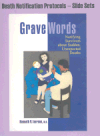|
Links:
 Death To Dust: What Happens To Dead Bodies?
Death To Dust: What Happens To Dead Bodies?
 Grave Words: Notifying Survivors About Unexpected
Deaths
Grave Words: Notifying Survivors About Unexpected
Deaths
 The
Gravest Words Video
The
Gravest Words Video
 Teaching Slides on Death Notification
Teaching Slides on Death Notification
 Death Investigation: The Basics
Death Investigation: The Basics
 Ethics In Emergency Medicine
Ethics In Emergency Medicine
 Pocket Protocols for Notifying Survivors about Sudden Unexpected
Deaths
Pocket Protocols for Notifying Survivors about Sudden Unexpected
Deaths
A
Sample Protocol to Use When Speaking With Survivors.
(Many
more protocols, with much more detail, are included in Grave
Words: Notifying Survivors About Unexpected Deaths Galen Press,
Ltd., Tucson, AZ, 1999. 342 pages, and Pocket Protocols: Notifying
Survivors About Sudden Unexpected Deaths Galen Press, Ltd.,
Tucson, AZ, 1999. 65 pages.z0
Table
7-1: Discussing Organ and Tissue Procurement with Survivors
|
Notify
|
- Ensure
that medical personnel have advised them of the death or
the hopelessness of the situation. If the same clinician
will both notify them and request organ/tissue donation,
separate the events emotionally and in time.
|
|
Meet
|
- Meet
the family as soon as the possibility of "brain death"
has been raised.
|
|
Support
|
- Help
the family gather the support (clergy, other family, friends)
they need. .
|
|
Understand Death
|
- Be
sure that survivors understand that the patient is or will
soon be dead—especially if the patient is dead by brain
criteria ("brain death").
|
|
Visitation
|
- Allow
survivors (includng children) to visit with the decedent's
body as soon and as often as possible.
|
|
The Situation
|
- Talk
to survivors about their perception of the accident or illness
and how the patienfs death may affect th~m incividually
and as a family.
|
|
Organ Donation
|
- Introduce
the subject of tissue and organ donation. Asking "Did
s/he ever mention organ donation?" may be enough.
|
|
Agreement
|
- Even
if they immediately agree to or request organ and tissue
donation, make certain that the person has the legal right
to agree. Continue supporting the family even after they
have agreed to the donation.
|
|
Information
|
- Provide
answers to survivors' questions about donation and the aftermath.
Repeat information as needed for clarification or as new
people arrive to assist the family. (See chapter 27.)
|
|
Discuss
|
- Encourage
survivors to discuss donation, even after they have made
a decision.
|
|
Paperwork
|
- Complete
the regional- and institutional-specific paperwork necessary
for the donation (or documenting the refusal). But do not
overburden survivors with the paperwork. Make it as simple
as possible for them and get as much information as possible
from secondary sources (medical records, license) or other
people (friends, minister).
|
|
More Information
|
- Give
survivors as much information as they want about the process
of donation, organ and tissue distribution, and subsequent
possibilities for funerary rites. (See chapter 27.)
|
|
Good-byes
|
- Help
survivors say good-bye to the patient before the donation.
|
|
 EXTRAS
EXTRAS


 The
The
 Teaching Slides on Death Notification
Teaching Slides on Death Notification
 Ethics In Emergency Medicine
Ethics In Emergency Medicine Pocket Protocols for Notifying Survivors about Sudden Unexpected
Deaths
Pocket Protocols for Notifying Survivors about Sudden Unexpected
Deaths